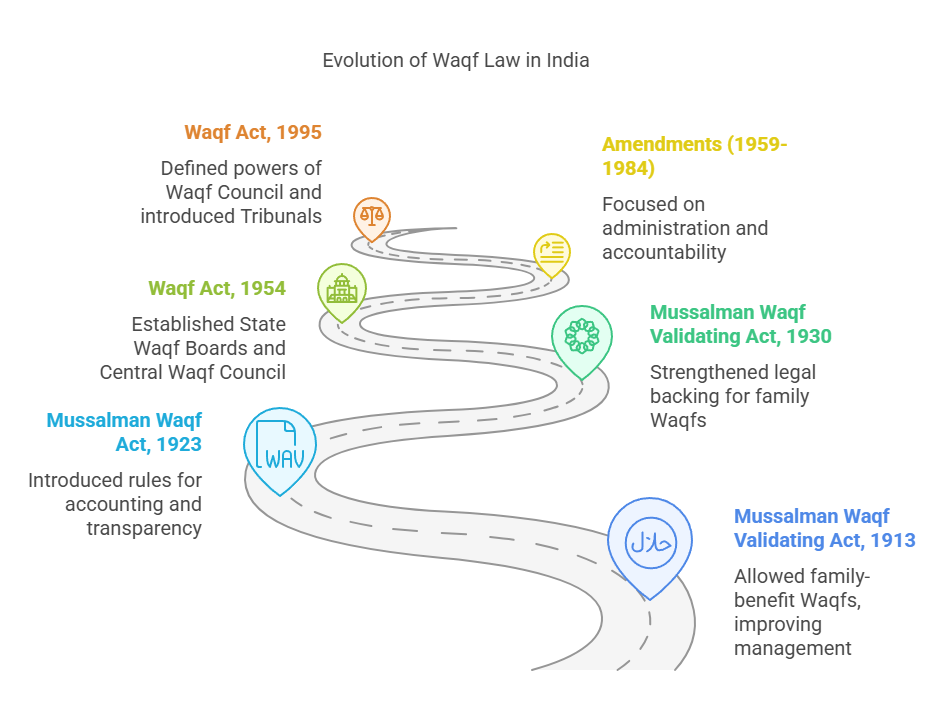Indian Polity
Waqf (Amendment) Act, 2025
- 04 Apr 2025
- 8 min read
For Prelims: Waqf (Amendment) Act, 2025 Parliament, Waqf Act,1995, Mutawallis, Limitation Act, 1963, Rights to Equality (Article 14), Article 26.
For Mains: The Waqf (Amendment) Act, 2025 and related concerns.
Why in News?
The Waqf (Amendment) Act, 2025 was passed by the Parliament and it has received assent of the President.
- The Act amends the Waqf Act, 1995, allowing the government to regulate Waqf properties and settle related disputes.
- The Act aims to improve Waqf board efficiency, update Waqf definitions, streamline registration, and boost use of technology in record management.
What is Waqf?
What is Waqf Board and Waqf Act, 1995?
|
Note: There are 8.72 lakh waqf properties, covering an area of more than 38 lakh acres.
Evolution of Waqf Law in India
What are the Key Provisions of the 2025 Act ?
- Separation of Trusts from Waqf: Muslim-created trusts under any law will no longer be considered Waqf, ensuring individuals retain full control over their trusts.
- Eligibility for Waqf Dedication: Only practicing Muslims (for at least five years) can dedicate their property to Waqf.
- Properties already registered with Waqf Boards will remain so unless disputed or identified as government land.
- Women's Rights in Family Waqf: Women must receive their inheritance before Waqf dedication, with special provisions for widows, divorced women, and orphans.
- Ending Arbitrary Property Claims: Section 40 of the original Waqf Act (1995) has been removed, preventing Waqf Boards from arbitrarily declaring properties as Waqf.
- Section 40 of the Waqf Act (1995) gives the Waqf Board the authority to decide whether a property is a Waqf property or not.
- Waqf Tribunals: The Waqf tribunals consist of 3 members i.e., a district judge, a state government officer (joint secretary level), and an expert in Muslim law and jurisprudence.
- Aggrieved parties can appeal directly to the concerned High Court within 90 days of receiving the Waqf tribunal’s order.
- Government Land & Waqf disputes: An officer above the rank of Collector will investigate government properties claimed as Waqf to prevent any unwarranted claims.
- Reduced Annual Contributions: Waqf institutions' mandatory contribution to Waqf Boards reduced from 7% to 5% allowing more funds to be allocated for charitable purposes.
- Annual Audit Reforms: Waqf institutions earning over Rs 1 lakh must undergo audits by State-appointed auditors.
- Technology & Central Portal: A centralized portal will automate Waqf property management, improving efficiency and transparency.
- Mutawallis (caretaker of a waqf) must register property details on the central portal.
- Diverse Representation: The Waqf Boards will include two non-Muslim members for inclusivity, and among Muslim members, at least two must be women.
- Representation from Shia, Sunni, Bohra, Aghakhani, and OBC Muslim communities is also mandated.
- Application of the Limitation Act: The Limitation Act, 1963, will now apply to Waqf property claims, reducing prolonged litigation.
- The Limitation Act, sets time limits for filing cases to ensure speedy disposal and prevent delays in legal proceedings.
What was the Need of Waqf (Amendment) Act, 2025?
- Irrevocability of Waqf Properties: The principle "once a Waqf, always a Waqf" ensures Waqf properties remain permanent, often causing complex disputes.
- E.g., It has sparked controversies, like ownership claims over islands in Bet Dwarka, where courts face legal challenges in determining ownership.
- Poor Management: The Waqf Act, 1995 has failed to prevent mismanagement and land encroachments.
- E.g., In Karnataka (between 1975 and 2020), 40 Waqf properties were notified, including farmlands, public spaces, government lands, graveyards, lakes, and temples.
- Lack of Judicial Oversight: Under the Waqf Act, 1995, Waqf Tribunal decisions cannot be appealed, which limits judicial review and reduces transparency.
- Misuse of Powers: Section 40 of the Waqf Act, 1995 has been used to declare private properties as Waqf, leading to legal battles.
- E.g., In Kerala, around 600 Christian families protested after the Waqf Board claimed their ancestral lands leading to legal disputes.
What Concerns are Related to the Waqf (Amendment) Act, 2025?
- Increased Government Control: Critics argue that the Act grants the government the authority to regulate Waqf properties and determine their status, thereby reducing the autonomy of Waqf Boards.
- The deletion of Section 40 of the Act, shifts the power to determine whether a property is Waqf to government officials.
- Dilution of Muslim Representation: Critics argue that allowing non-Muslim officials on Waqf Boards violates the community’s right to manage its religious affairs under Article 26.
- Ambiguity in Defining a “Practising Muslim”: The Act lacks a clear definition of "practising Muslims" for Waqf property allocation, which may lead to legal challenges due to varied interpretations by religious scholars.
- Removal of "Waqf by User" Principle: Critics fear that removing "Waqf by user," which recognizes properties through long-term religious use, may lead to many existing sites losing their Waqf status.
Conclusion
The 2025 Act aims to enhance transparency, prevent misuse, and streamline dispute resolution through legal and technological reforms. However, concerns over government control, representation, and property rights must be addressed through dialogue to balance regulatory oversight with community autonomy. The rules for the Waqf (Amendment) Act, 2025 are yet to be released and are expected to address ambiguity and other concerns.
|
Drishti Mains Question: How does Waqf (Amendment) Act, 2025 seek to reform Waqf governance, and what concerns have been raised regarding its provisions? |
UPSC Civil Services Examination, Previous Year Questions (PYQs)
Mains
Q. How is the Indian concept of secularism different from the western model of secularism? Discuss. (2018)






